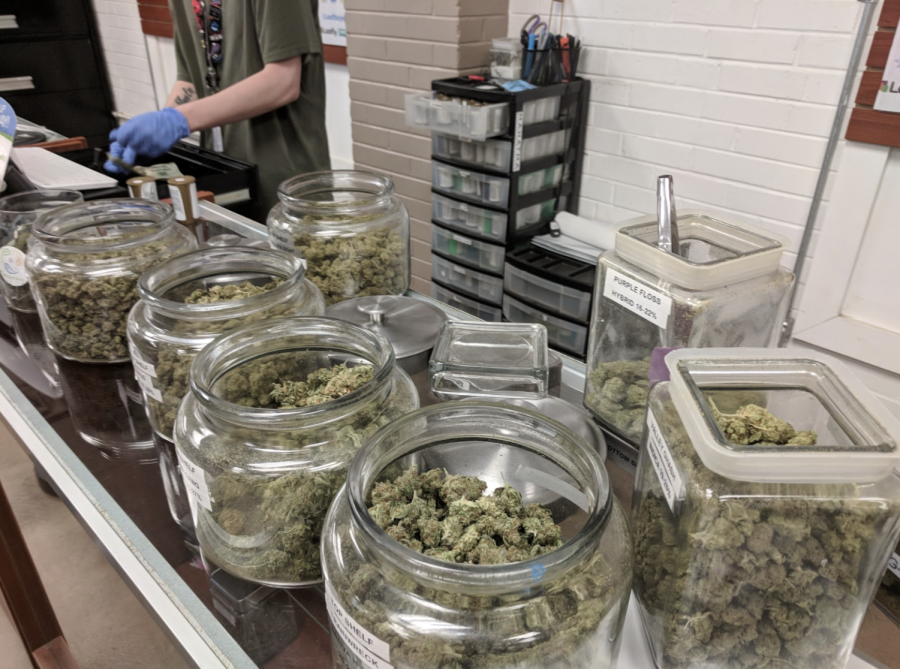NH passing legislation so you don’t get lit up while lighting up
The legalization of cannabis has been long awaited in New Hampshire, which raises some moral questions for college students. (Courtesy / Wikimedia)
April 20, 2023
Happy 4/20, everyone! The New Hampshire House is currently working through legislation to legalize the sale and consumption of marijuana in the state. Bipartisan support for the bill has shown that the Granite State is ready to make its high mountain peaks just a little bit higher. As of the writing of this article, the bill is bogged down as legislators work out the details of taxation and funding allocations, but the premise of legalizing cannabis certainly has momentum in Concord. This move seems to be quite late, however, as New Hampshire will be the last state in New England to pass such legislation.
The current proposal would tax the sale of cannabis products at a rate of 12.5% at the wholesale level. This revenue would be distributed to a variety of public needs in the state, particularly to research on cannabis regulation and public education, as well as NH state retirement funds, substance abuse rehabilitation programs, children’s behavioral health services, and for the training of drug recognition experts. The enforcement of new regulations regarding cannabis, including the administration of new cannabis businesses, would be absorbed by the state’s existing Liquor Commission.
So, the legalization of marijuana sounds like a great move for the State of New Hampshire. This legislation will generate a substantial amount of revenue for the state from a product which is easily obtained anywhere else in the region. It will generate jobs both in the private sector and the state government. It will also keep money in New Hampshire, rather than sending residents of the state over the border to pick up some recreational-use cannabis. As a resident of the border town of Haverhill, MA, which has several dispensaries, I can certainly attest to the substantial number of NH license plates I see in the parking lots of those establishments. From an economic standpoint, this bill is a no-brainer. However, there are many social questions which arise from the legalization of, let’s be honest, a recreational drug, especially for those of us who live on a college campus.
Unless you live under a rock, it is no secret that cannabis use is common, even in states where it has not yet been legalized. People will always be able to find a supply of marijuana whether it is legal or not, just as they are able to obtain cocaine, heroine, or any other intoxicant. Of course, we all know how the prohibition of alcohol went in the early 20th century. So why should cannabis, or any other personal use substance, be treated any differently than the vices which we already consume legally? Is there anything inherently immoral about consuming cannabis?
I would argue that, so long as it is done in moderation, there is nothing wrong with using cannabis or any other mind-altering substance for that matter. While I do not personally consume marijuana, I do enjoy a glass of scotch or the occasional pipe, and I don’t see how they are any different from a moral perspective. Vices are not inherently bad, so long as they are used for the right reasons. They only become an issue when people are driven to misuse a substance by whatever motivations, addictions, or other circumstances they may be experiencing Though I do drink and smoke in moderation, I do not condone or advocate for binge drinking or chain smoking, and a chemical addiction to any substance is something which can and should be treated by medical and mental health professionals.
This is especially true for college students who, whether we like it or not, are known for the wild excesses of our social habits. Drinking at a party can certainly be enjoyable when it is done in moderation. Partying, drinking, and the rest only becomes problematic when it is done to a point that it negatively impacts other parts of your life. Adding cannabis to the mix does not really change any of the social or moral implications of a lifestyle of enjoyable moderation. There is a significant difference between enjoying something and abusing something. For those that enjoy cannabis but do not abuse it, I am glad that the state with the motto, “Live Free or Die,” is finally coming to its senses and allowing for some individual freedom.




[email protected] • Apr 23, 2023 at 3:10 pm
I think this is a bad idea I think all states need to rethink this law. Marijuana is a gateway. Drug has always been a gateway drug and will always be a gateway drug. The only reason why the states passing it is because they know it brings in more money for the states there are going to be consequences for this not only are you promoting drugs but you’re also putting a lot of businesses out of business, especially CBD businesses that are legit that is not classified as a drug way to go to New Hampshire. You think you’ve got a drug problem now it’s going to be far worse
Richie • Apr 22, 2023 at 2:17 pm
Just so you know;
‘People will always be able to find a supply of marijuana whether it is legal or not, just as they are able to obtain cocaine, HEROINE, or any other intoxicant.’ emphasis added
It’s actually heroin, nor heroine.
Heroine is a female hero in a story.
It’s a